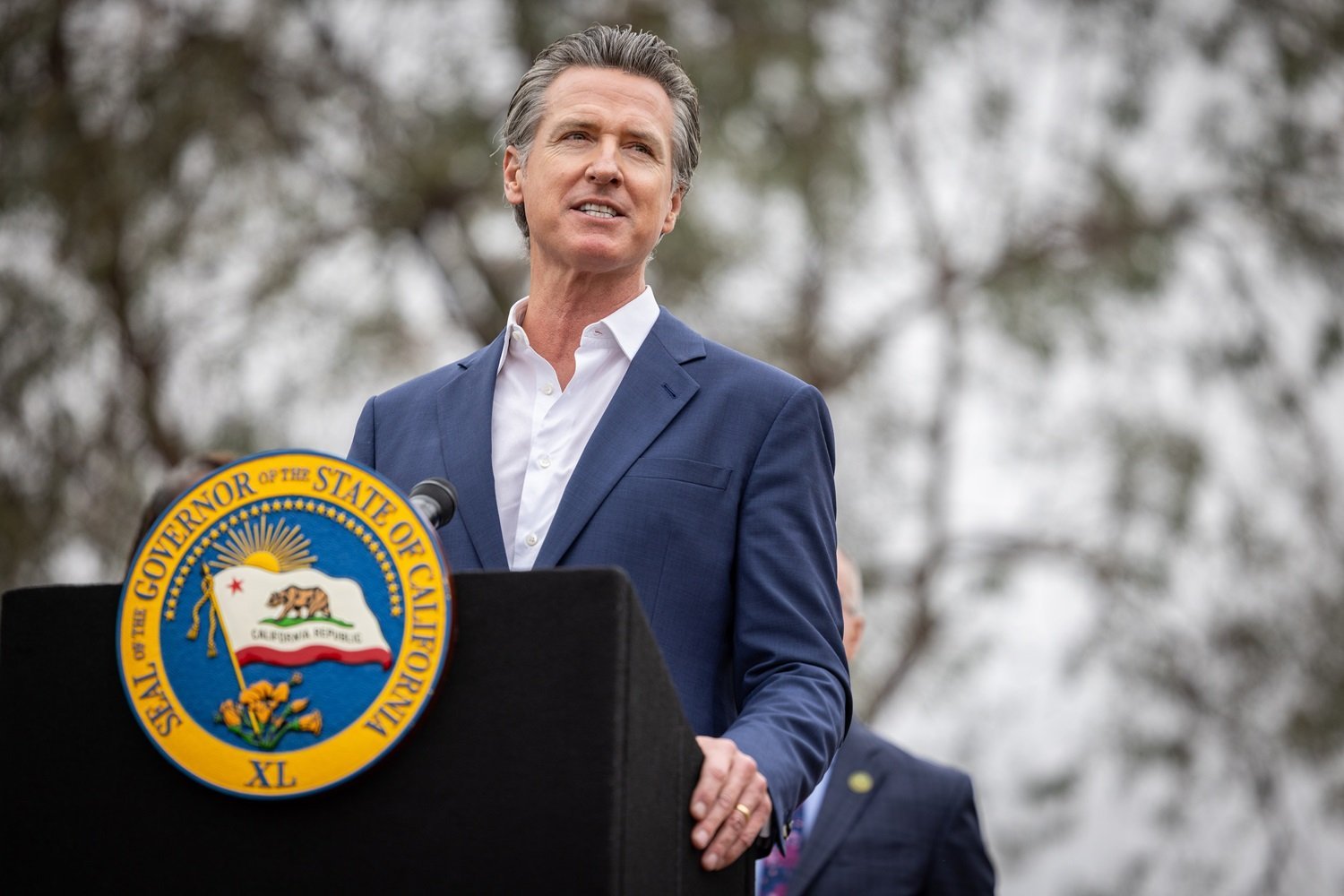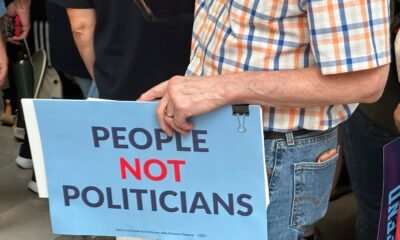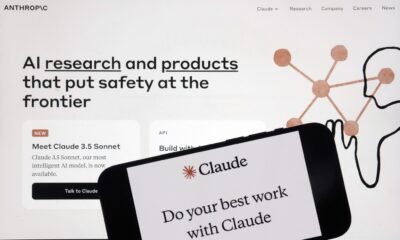AI Insights
California Lawmakers Once Again Challenge Newsom’s Tech Ties with AI Bill

Last year, California Governor Gavin Newsom vetoed a wildly popular (among the public) and wildly controversial (among tech companies) bill that would have established robust safety guidelines for the development and operation of artificial intelligence models. Now he’ll have a second shot—this time with at least part of the tech industry giving him the green light. On Saturday, California lawmakers passed Senate Bill 53, a landmark piece of legislation that would require AI companies to submit to new safety tests.
Senate Bill 53, which now awaits the governor’s signature to become law in the state, would require companies building “frontier” AI models—systems that require massive amounts of data and computing power to operate—to provide more transparency into their processes. That would include disclosing safety incidents involving dangerous or deceptive behavior by autonomous AI systems, providing more clarity into safety and security protocols and risk evaluations, and providing protections for whistleblowers who are concerned about the potential harms that may come from models they are working on.
The bill—which would apply to the work of companies like OpenAI, Google, xAI, Anthropic, and others—has certainly been dulled from previous attempts to set up a broad safety framework for the AI industry. The bill that Newsom vetoed last year, for instance, would have established a mandatory “kill switch” for models to address the potential of them going rogue. That’s nowhere to be found here. An earlier version of SB 53 also applied the safety requirements to smaller companies, but that has changed. In the version that passed the Senate and Assembly, companies bringing in less than $500 million in annual revenue only have to disclose high-level safety details rather than more granular information, per Politico—a change made in part at the behest of the tech industry.
Whether that’s enough to satisfy Newsom (or more specifically, satisfy the tech companies from whom he would like to continue receiving campaign contributions) is yet to be seen. Anthropic recently softened on the legislation, opting to throw its support behind it just days before it officially passed. But trade groups like the Consumer Technology Association (CTA) and Chamber for Progress, which count among its members companies like Amazon, Google, and Meta, have come out in opposition to the bill. OpenAI also signaled its opposition to regulations California has been pursuing without specifically naming SB 53.
After the Trump administration tried and failed to implement a 10-year moratorium on states implementing regulations on AI, California has the opportunity to lead on the issue—which makes sense, given most of the companies at the forefront of the space are operating within its borders. But that fact also seems to be part of the reason Newsom is so shy to pull the trigger on regulations despite all his bluster on many other issues. His political ambitions require money to run, and those companies have a whole lot of it to offer.
AI Insights
Cisco’s WebexOne Event Spotlights Global AI Brands and Ryan Reynolds, Acclaimed Actor, Film Producer, and Entrepreneur

Customer speakers include CarShield Founder, President and COO Steve Proetz; Topgolf Director of Global Technology Delivery Doug Klausen; GetixHealth CTO David Stuart; HD Supply Vice President of IT Emil DiMotta III and more, along with Cisco partners and leaders
SAN JOSE, Calif., Sept. 15 2025 — Cisco (NASDAQ: CSCO) today announced its luminary customers and partners headlining WebexOne, Cisco’s annual AI Collaboration and Customer Experience event, taking plance from September 28 – October 1, 2025 in San Diego. This year, executives from top global brands will take the stage to highlight how Cisco is addressing today’s demands for AI-powered innovations for the employee and customer experience.
WHO: Webex by Cisco, a leader in powering employee and customer experience solutions with AI, is hosting its annual signature event, WebexOne.
WHAT: The multiday event will explore trending topics shaping today’s workforce across generative AI, customer experience, and conferencing and office tech. WebexOne will feature the latest innovations from Cisco, executive-led sessions on product and strategy news, and customer conversations with inspiring leaders from the world’s leading brands.
-
Featured Brands and Customers: More than 50 Webex customers and partners will speak at WebexOne, including Conagra Brands, Kennedy Space Center, Brightli and more. All will address how they’re partnering with Cisco to revolutionize customer experiences and collaboration with AI.
-
Luminary Speakers: Ryan Reynolds, acclaimed Actor, film Producer, and Entrepreneur, will be the closing keynote. Ryan will explore the art of creative leadership, storytelling, and innovation across entertainment, business, and beyond. Deepu Talla, Vice President of Robotics and Edge AI at NVIDIA, will offer a visionary look at the new era of AI, highlighting the transformative possibilities ahead.
-
Inspiring Cisco Leaders: Cisco executives, including Jeetu Patel, President and Chief Product Officer, Anurag Dhingra, SVP & GM of Cisco Collaboration, Aruna Ravichandran, SVP and Chief Marketing & Customer Officer, and others will take the stage to discuss Cisco’s vision for artificial intelligence, customer experience, and collaboration. They will also showcase the latest technology revolutionizing the future of work and customer experience, and discuss how they integrate with Cisco’s broader product portfolio.
All attendees will also have the option to attend a training program that offers hands-on demos, 200+ hours of learning from 82 classes and labs, and 100+ breakout sessions featuring top customers and Cisco speakers.
Cisco will also announce its fourth-annual Webex Customer Award winners at the event.
WHEN:
September 28 – October 1, 2025, beginning at 9 a.m. PT
WHERE:
In-person: Marriott Marquis, San Diego Marina
Broadcast virtually: Using the Webex Events app
For press interested in behind-the-scenes exclusive access onsite at WebexOne, please contact Webex PR at webexpr@external.cisco.com. For general registration, please visit the link here.
AI Insights
Darwin Awards For AI Celebrate Epic Artificial Intelligence Fails

As the AI Darwin Awards prove, some AI ideas turn out to be far less bright than they seem.
getty
Not every artificial intelligence breakthrough is destined to change the world. Some are destined to make you wonder “With all this so-called intelligence flooding our lives, how could anyone think that was a smart idea?” That’s the spirit behind the AI Darwin Awards, which recognize the most spectacularly misguided uses of the technology. Submissions are open now.
Reads an introduction to the growing list of nominees, which include legal briefs replete with fictional court cases, fake books by real writers and an Airbnb host manipulating images with AI to make it appear a guest owed money for damages:
“Behold, this year’s remarkable collection of visionaries who looked at the cutting edge of artificial intelligence and thought, ‘Hold my venture capital.’ Each nominee has demonstrated an extraordinary commitment to the principle that if something can go catastrophically wrong with AI, it probably will — and they’re here to prove it.”
A software developer named Pete — who asked that his last name not be used to protect his privacy — launched the AI Darwin Awards last month, mostly as a joke, but also as a cheeky reminder that humans ultimately decide how technology gets deployed.
Don’t Blame The Chainsaw
“Artificial intelligence is just a tool — like a chainsaw, nuclear reactor or particularly aggressive blender,” reads the website for the awards. “It’s not the chainsaw’s fault when someone decides to juggle it at a dinner party.
“We celebrate the humans who looked at powerful AI systems and thought, ‘You know what this needs? Less testing, more ambition, and definitely no safety protocols!’ These visionaries remind us that human creativity in finding new ways to endanger ourselves knows no bounds.”
The AI Darwin Awards are not affiliated with the original Darwin Awards, which famously call out people who, through extraordinarily foolish choices, “protect our gene pool by making the ultimate sacrifice of their own lives.” Now that we let machines make dumb decisions for us too, it’s only fair they get their own awards.
Who Will Take The Crown?
Among the contenders for the inaugural AI Darwin Awards winner are the lawyers who defended MyPillow CEO Mike Lindell in a defamation lawsuit. They submitted an AI-generated brief with almost 30 defective citations, misquotes and references to completely fictional court cases. A federal judge fined the attorneys for their misstep, saying they violated a federal law requiring that lawyers certify court filings are grounded in the actual law.
Another nominee: the AI-generated summer reading list published earlier this year by the Chicago Sun Times and The Philadelphia Inquirer that contained fake books by real authors. “WTAF. I did not write a book called Boiling Point,” one of those authors, Rebecca Makkai, posted to BlueSky. Another writer, Min Jin Lee, also felt the need to issue a clarification.
“I have not written and will not be writing a novel called Nightshare Market,” the Pachinko author wrote on X. “Thank you.”
Then there’s the executive producer at Xbox Games Studios who suggested scores of newly laid-off employees should turn to chatbots for emotional support after losing their jobs, an idea that did not go over well.
“Suggesting that people process job loss trauma through chatbot conversations represents either breathtaking tone-deafness or groundbreaking faith in AI therapy — likely both,” the submission reads.
What Inspired The AI Darwin Awards?
The creator of the awards, who lives in Melbourne, Australia, and has worked in software for three decades, said he frequently uses large language models, including to craft the irreverent text for the AI Darwin Awards website. “It takes a lot of steering from myself to give it the desired tone, but the vast majority of actual content, probably 99%, is all the work of my LLM minions,” he said in an interview.
Pete got the idea for the awards as he and co-workers shared their experiences with AI on Slack. “Occasionally someone would post the latest AI blunder of the day and we’d all have either a good chuckle, or eye-roll or both,” he said.
The awards sit somewhere between reality and satire.
“AI will mean lots of good things for us all and it will mean lots of bad things,” the contest’s creator said. “We just need to work out how to try and increase the good and decrease the bad. In fact, our first task is to identify both the good and the bad. Hopefully the AI Darwin Awards can be a small part of that by highlighting some of the ‘bad.’”
He plans to invite the public to vote on candidates in January, with the winner to be announced in February.
For those who’d rather not win an AI Darwin Award, the site includes a handy guide for how for avoiding the dubious distinction. It includes these tips: “Test your AI systems in safe environments before deploying them globally,” “consider hiring humans for tasks that require empathy, creativity or basic common sense” and “ask ‘What’s the worst that could happen?’ and then actually think about the answer.”
AI Insights
Redefining speed: The AI revolution in clinical decision-making

Clinicians need one main thing: More time
As the EHR and data collection have become more robust, clinicians are spending more time on paperwork and administration. The American Medical Association conducted surveys in 2024 and found that physicians spent an average of 13 hours on indirect patient care (order entry, documentation, lab interpretation) and over seven hours on administrative tasks (prior authorization, insurance forms, meetings). On top of patient care, this meant a 57.8-hour workweek.
Ultimately, clinicians need more time with their patients and less time taking notes. They need more time to understand complex cases and less time spent searching for information. Information overload is also a challenge: Medical knowledge is doubling every 73 days, and patients are increasingly relying on multiple medications. It also takes an average of 17 years between clinical discovery and changing practice based on evidence—clinicians need efficient ways to stay updated in their area of expertise.
AI can produce time savings that add up
We’re seeing a revolution in how artificial intelligence (AI) can support them. As AI is introduced further into healthcare administrative work and clinical settings, there are opportunities for clinicians to be more productive and meaningful with their time.
When we look at how AI-enabled features can save time for clinicians, the amazing thing is that it’s not massive blocks of time—like 5 or 10 minutes. It’s 10 seconds on a task, or 30 seconds here, or 45 seconds there. And the clinicians we speak with are so happy about it. AI can help speed up the little things—the couple of clicks saved—and over time, that can make a huge difference. It’s multiple moments of small savings that add up to these meaningful productivity gains.
So, as we find ways to further integrate UpToDate into the workflow, this is what we think about: Finding those extra moments that matter. Getting clinical information closer to the provider so they don’t have to open extra applications for decision-making. We’re looking for multiple ways to get evidence and clinical intelligence streamlined throughout the care experience and into the EHR, presenting tremendous opportunities for time savings.
The opportunities are plentiful. How can ambient and note-taking technology link to the relevant evidence-based clinical content for quick reference? How could patient interactions with chatbots ahead of a clinic visit prep the provider with relevant evidence in advance? Identifying innovative partners that can work alongside us in ambient solutions, documentation, chatbots, and more can help bring content and evidence closer to clinicians and save those seconds over time.
Time savings can bring new clinical opportunities
What can clinicians do with that saved time? Some have been concerned that GenAI tools will deteriorate clinical decision-making skills—our recent Future Ready Healthcare report showed that 57% of respondents share these concerns. But I like to think about the opportunities created through those time savings: How can AI help open up space for deeper critical thinking?
With AI saving time and supporting smaller tasks, the first thing it can do is alleviate some of the administrative burden, which is already happening. It can also expand critical thinking opportunities and provide space to consider challenges in healthcare that historically we haven’t had time to solve. It can “re-humanize medical practice” in a way that provides professional fulfillment and allows clinicians to spend more time as caregivers, rather than note-takers. When these efforts are scaled across the workforce, it can result in productivity gains and operational efficiencies across an enterprise.
AI tools need to be grounded in expert-driven evidence
As we rapidly move into the AI era, it’s easy to find tools that seem to give faster answers, especially among generative AI (GenAI) tools. But are they grounded in evidence and industry recommendations?
Keeping expert clinicians in the loop is critical—if you’ve trusted UpToDate for a while, you’ll know this is our position. Our clinical decision support is grounded not just in evidence but in the recommendations of over 7,600 clinical practitioners and experts who curate content as new evidence emerges, and provide graded recommendations to help guide decision-making, even when the conditions are gray. Relying on clinical recommendations curated by human experts keeps the information and care guidance current and relevant. As AI is layered on top of these human-generated recommendations, clinicians can start finding information more efficiently—saving precious seconds with each patient.
We know this expertise matters. A 2024 Wolters Kluwer Health survey of US physicians showed they were overall positive about the prospects of GenAI in clinical settings; however, 91% said they would have to know the materials the AI was trained on were created by doctors and medical experts in order to trust it. They also overwhelmingly wanted (89%) the technology vendor to be transparent about where the information came from, who created it, and how it was sourced.
The UpToDate, you know and trust, is entering a new era, which is in line with Bud Rose’s vision for a consultative conversation with clinical experts. And we’re just getting started—join us in helping shape the next wave of healthcare innovation.
Read our vision for the future of healthcare and explore our perspectives on AI in clinical content.
-

 Business2 weeks ago
Business2 weeks agoThe Guardian view on Trump and the Fed: independence is no substitute for accountability | Editorial
-
Tools & Platforms1 month ago
Building Trust in Military AI Starts with Opening the Black Box – War on the Rocks
-

 Ethics & Policy2 months ago
Ethics & Policy2 months agoSDAIA Supports Saudi Arabia’s Leadership in Shaping Global AI Ethics, Policy, and Research – وكالة الأنباء السعودية
-

 Events & Conferences4 months ago
Events & Conferences4 months agoJourney to 1000 models: Scaling Instagram’s recommendation system
-

 Jobs & Careers3 months ago
Jobs & Careers3 months agoMumbai-based Perplexity Alternative Has 60k+ Users Without Funding
-

 Podcasts & Talks2 months ago
Podcasts & Talks2 months agoHappy 4th of July! 🎆 Made with Veo 3 in Gemini
-

 Education3 months ago
Education3 months agoVEX Robotics launches AI-powered classroom robotics system
-

 Education2 months ago
Education2 months agoMacron says UK and France have duty to tackle illegal migration ‘with humanity, solidarity and firmness’ – UK politics live | Politics
-

 Podcasts & Talks2 months ago
Podcasts & Talks2 months agoOpenAI 🤝 @teamganassi
-

 Funding & Business3 months ago
Funding & Business3 months agoKayak and Expedia race to build AI travel agents that turn social posts into itineraries





















